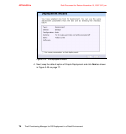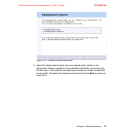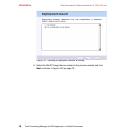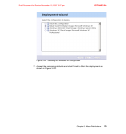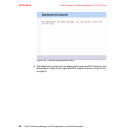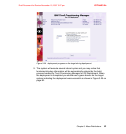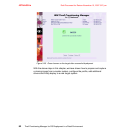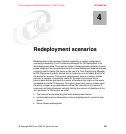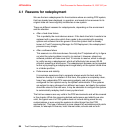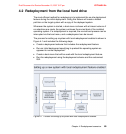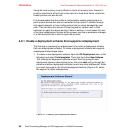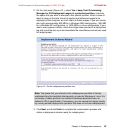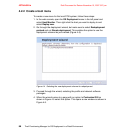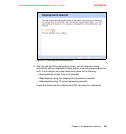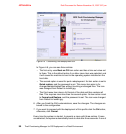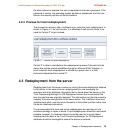4372ch04.fm Draft Document for Review November 15, 2007 3:27 pm
84 Tivoli Provisioning Manager for OS Deployment in a Retail Environment
4.1 Reasons for redeployment
We use the term redeployment for the situations where an existing POS system,
that has already been deployed, in operation, and needs to be recovered to its
original state as it was originally installed as a new system.
There are different reasons for redeployments, depending on the environment
and the situation.
After a hard drive failure
This is probably the most obvious reason. If the hard drive fails it needs to be
replaced with a new drive which then needs to be provided with operating
system and software from the ground. Since the system itself is already
known to Tivoli Provisioning Manager for OS Deployment, the redeployment
process is very simple.
After a software failure
This scenario is a little less obvious. Normally the IT helpdesk will try to figure
out what the actual problem is and try to resolve it. However, almost any
software problem will take more than 15 minutes to resolve, which is enough
to justify issuing a redeployment, which will effectively take around 20-25
minutes, assuming a local server. The redeployment process can be speeded
further up by keeping a redeployment image locally on the system’s hard drive
in a hidden partition.
Performance and stability
It is common experience that a computer always works the best and the
fastest on the day it is installed. At that time, the system is completely clean,
free of any undesirable CPU-consuming gadgets, and all programs are
configured for their optimal use by the system administrator. If the systems
are subject to many changes from different end users, but ideally the system
should be clean for the next user, it may be advisable to configure the system
to automatically redeploy itself at every system boot.
The first two reasons are very valid in the POS environments and will be covered
in this chapter. While the reasoning behind performance and stability are also
valid, the typical use of a POS system does not include letting users do any
customizations or even using the systems to other things than the POS
application(s). This type of scenario is more relevant for workstations with public
access, for example in libraries, hotel Internet cafés, schools and so forth.



